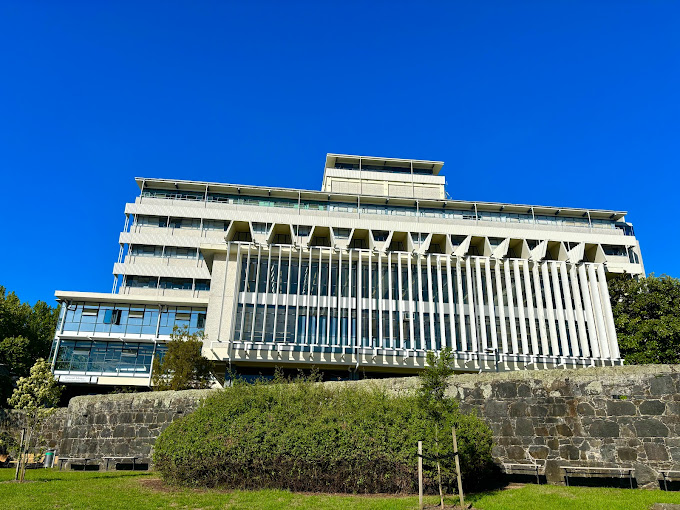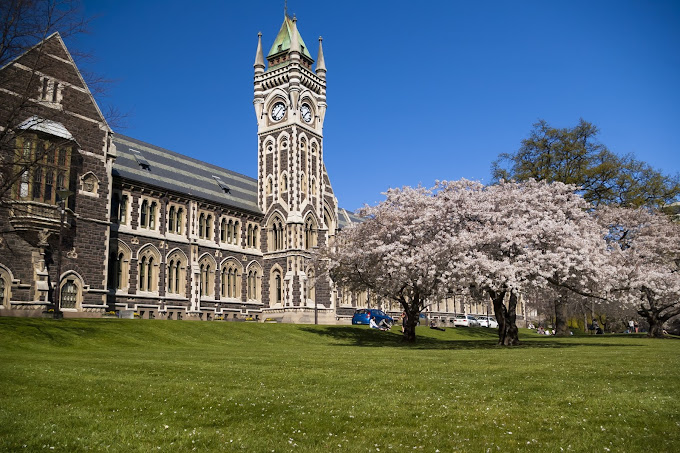New Zealand’s world-class education system emphasises practical learning, critical thinking, and a well-rounded student experience. The country has eight prestigious universities, providing students with many opportunities. Check out the blog to learn more about the best universities in New Zealand, including ranking, acceptance rate, students’ experiences, the best universities in New Zealand, and many more details.
Best Universities in New Zealand
1. The University of Auckland
The University of Auckland, established in 1883, is New Zealand’s largest and top-ranked university. Consistently placed among the world’s best 100, it excels in research, teaching, and student life. Renowned for its engineering, medicine, law, and business programs, the university offers cutting-edge facilities, hands-on learning opportunities, and a vibrant campus life in the heart of Auckland.

| Category | Information |
|---|---|
| Rankings | #1 in New Zealand (QS World University Rankings 2023) #85 globally (QS World University Rankings 2023) |
| Acceptance Rate | Around 20% (varies by program) |
| Required Exams | IELTS or TOEFL for English proficiency<br>GRE (for some graduate programs) |
| Average IELTS Scores | Minimum 6.0 in each band, with an overall score of 6.5 |
| Tuition Fees (2023) | NZ$36,000-$48,000 (Undergraduate) NZ$40,000-$52,000 (Graduate) – Engineering programs |
| Estimated Living Expenses | NZ$20,000-$25,000 per year |
| Average Starting Salary | NZ$50,000-$65,000 (varies by discipline) |
| Notable Engineering Programs | Civil Engineering, Electrical and Electronic Engineering, Mechanical Engineering, Software Engineering |
2. The University of Otago
Established in 1869, the University of Otago is New Zealand’s oldest and one of the Best Universities in New Zealand. It boasts world-class research and prestigious health sciences, humanities, and sciences programs. Otago’s stunning Dunedin campus offers a unique blend of history and modern facilities, while the vibrant student city provides a rich cultural scene and outdoor adventures.

| Category | Information |
|---|---|
| Rankings | #2 in New Zealand (QS World University Rankings 2023) #217 globally (QS World University Rankings 2023) |
| Acceptance Rate | Around 70-80% (varies by program) |
| Required Exams | IELTS or TOEFL for English proficiency GRE (for some graduate programs) |
| Average IELTS Scores | Minimum 6.0 in each band, with an overall score of 6.5 |
| Tuition Fees (2023) | NZ$30,000-$38,000 (Undergraduate) NZ$34,000-$40,000 (Graduate) – Science and Applied Science |
| Estimated Living Expenses | NZ$15,000-$20,000 per year |
| Average Starting Salary | NZ$45,000-$60,000 (varies by discipline) |
| Notable Programs | Health Sciences, Sciences, Humanities, Commerce |
3. Victoria University of Wellington
Founded in 1897, Victoria University of Wellington is a top New Zealand institution known for law, business, and humanities. This prestigious university in the heart of Wellington fosters a vibrant student life with its innovative teaching methods and strong research focus. It also boasts respected programs in creative fields, capitalizing on its location in New Zealand’s.

| Category | Information |
|---|---|
| Rankings | #3 in New Zealand (QS World University Rankings 2023) #236 globally (QS World University Rankings 2023) |
| Acceptance Rate | Around 60-70% (varies by program) |
| Required Exams | IELTS or TOEFL for English proficiency GRE (for some graduate programs) |
| Average IELTS Scores | Minimum 6.0 in each band, with an overall score of 6.5 |
| Tuition Fees (2023) | NZ$28,000-$38,000 (Undergraduate) NZ$32,000-$40,000 (Graduate) – Engineering and Computer Science |
| Estimated Living Expenses | NZ$18,000-$22,000 per year |
| Average Starting Salary | NZ$48,000-$62,000 (varies by discipline) |
| Notable Programs | Law, Humanities, Social Sciences, Science (including Computer Science and Engineering) |
4. University of Canterbury
Established in 1873, the University of Canterbury is located in Christchurch, the largest city in New Zealand’s South Island. Known for its strong engineering and science programs, the university also offers a wide range of courses across arts, commerce, and more. Its park-like campus provides modern facilities and a supportive learning environment.

| Category | Information |
|---|---|
| Rankings | #4 in New Zealand (QS World University Rankings 2023) #284 globally (QS World University Rankings 2023) |
| Acceptance Rate | Around 80% (varies by program) |
| Required Exams | IELTS or TOEFL for English proficiency GRE (for some graduate programs) |
| Average IELTS Scores | Minimum 6.0 in each band, with an overall score of 6.5 |
| Tuition Fees (2023) | NZ$32,000-$40,000 (Undergraduate) NZ$35,000-$42,000 (Graduate) – Engineering programs |
| Estimated Living Expenses | NZ$16,000-$20,000 per year |
| Average Starting Salary | NZ$47,000-$58,000 (varies by discipline) |
| Notable Programs | Engineering, Science, Forestry, Education, Business |
5. Massey University
Founded in 1927, Massey University is known for its flexibility and innovation in distance learning. With three campuses across New Zealand (Palmerston North, Auckland, and Wellington), it offers a wide range of programs, particularly strong in agriculture, aviation, and creative arts. Massey is also recognized for its business school and veterinary science program.

| Category | Information |
|---|---|
| Rankings | #5 in New Zealand (QS World University Rankings 2023) #284 globally (QS World University Rankings 2023) |
| Acceptance Rate | Around 75% (varies by program) |
| Required Exams | IELTS or TOEFL for English proficiency GRE (for some graduate programs) |
| Average IELTS Scores | Minimum 6.0 in each band, with an overall score of 6.5 |
| Tuition Fees (2023) | NZ$28,000-$36,000 (Undergraduate) NZ$32,000-$38,000 (Graduate) |
| Estimated Living Expenses | NZ$15,000-$18,000 per year |
| Average Starting Salary | NZ$45,000-$55,000 (varies by discipline) |
| Notable Programs | Agriculture, Aviation, Creative Arts, Business, Veterinary Science |
6. University of Waikato
Established in 1964, the University of Waikato is located in Hamilton, with a satellite campus in Tauranga. Known for its innovative research, particularly in environmental sciences, psychology, and education, Waikato offers a comprehensive range of programs. The university is recognized for its strong ties with local industries and communities.

| Category | Information |
|---|---|
| Rankings | #6 in New Zealand (QS World University Rankings 2023) #331 globally (QS World University Rankings 2023) |
| Acceptance Rate | Around 85% (varies by program) |
| Required Exams | IELTS or TOEFL for English proficiency GRE (for some graduate programs) |
| Average IELTS Scores | Minimum 6.0 in each band, with an overall score of 6.5 |
| Tuition Fees (2023) | NZ$26,000-$34,000 (Undergraduate) NZ$30,000-$36,000 (Graduate) |
| Estimated Living Expenses | NZ$14,000-$17,000 per year |
| Average Starting Salary | NZ$44,000-$52,000 (varies by discipline) |
| Notable Programs | Environmental Sciences, Psychology, Education, Management, Computer Science |
7. Auckland University of Technology (AUT)
Founded in 2000 (but with a history dating back to 1895 as a technical college), AUT is New Zealand’s newest university. Located primarily in Auckland, it has quickly established itself as a dynamic and innovative institution. AUT is known for its industry-focused programs, strong emphasis on technology, and hands-on learning approaches.

| Category | Information |
|---|---|
| Rankings | #7 in New Zealand (QS World University Rankings 2023) #437 globally (QS World University Rankings 2023) |
| Acceptance Rate | Around 90% (varies by program) |
| Required Exams | IELTS or TOEFL for English proficiency GRE (for some graduate programs) |
| Average IELTS Scores | Minimum 6.0 in each band, with an overall score of 6.5 |
| Tuition Fees (2023) | NZ$28,000-$36,000 (Undergraduate) NZ$32,000-$38,000 (Graduate) |
| Estimated Living Expenses | NZ$18,000-$22,000 per year |
| Average Starting Salary | NZ$46,000-$56,000 (varies by discipline) |
| Notable Programs | Art and Design, Communications, Engineering, Health Sciences, Information Technology |
Student Life and Experience at Top Universities in New Zealand
Here’s a table summarizing the key points about student life and experience at New Zealand’s top universities:
| Aspect | Details |
|---|---|
| Campus Facilities | – Modern libraries with extensive collections and digital resources – State-of-the-art laboratories and research centers – Well-equipped classrooms with cutting-edge technology – Recreational facilities like gyms, sports courts, and swimming pools – Student centers, cafes, and social spaces |
| Housing Options | – Catered and self-catered halls of residence – Apartments – Residential colleges – Options to suit different lifestyles, budgets, and preferences |
| Student Support Services | – Academic advising – Career counseling – Health and wellness services – Disability support – International student support |
| Extracurricular Activities | – Sports teams – Cultural organizations – Academic societies – Community service initiatives – Opportunities for personal growth and exploration |
| Cost of Living | – Tuition fees: NZ$25,000 – NZ$40,000 per year (undergraduate) – Tuition fees: NZ$30,000 – NZ$50,000 per year (postgraduate) – Living expenses: Accommodation, food, transportation – On-campus employment opportunities – Scholarships and financial aid programs – Possibility of part-time work (subject to visa terms) |
Career Prospects and Alumni Networks
Frustrated with Generic College Lists from AI Tools?
Get a tailored college shortlist crafted by study abroad experts who understand YOUR goals, profile, and aspirations.

1. Employability of graduates from top universities
Graduates from the Best Universities in New Zealand are highly sought after by employers, both within the country and globally. These institutions have a reputation for producing well-rounded, skilled, and knowledgeable professionals who are equipped to excel in their chosen fields. The strong industry connections and career services provided by these universities play a crucial role in facilitating successful career transitions for their graduates.
2. Notable alumni and their achievements
New Zealand’s top universities boast an impressive list of accomplished alumni who have made significant contributions in various fields. From prime ministers and business leaders to renowned artists and scientists, these alumni serve as inspirational examples of the potential that a quality education from these institutions can unlock. Their achievements not only bring recognition to their alma maters but also serve as a source of motivation for current and prospective students.
3. Career services and industry connections
Recognizing the importance of preparing students for successful careers, these top universities in New Zealand invest heavily in career services and industry connections. These institutions often have dedicated career centers that offer services such as resume and interview preparation, job search assistance, networking events, and career fairs. Additionally, many universities have established partnerships with leading companies and organizations, facilitating internship opportunities, guest lectures, and industry collaborations, which provide students with valuable real-world experience and connections.
Admission Requirements and Application Process
1. Academic requirements (e.g., high school grades, standardized tests)
The admission requirements for international students at New Zealand’s top universities vary depending on the program and the institution, but generally, they include:
- High school qualifications: Most universities require students to have completed a recognized secondary school qualification, such as the Indian Higher Secondary Certificate with a minimum overall percentage of 75-80% or the International Baccalaureate Diploma with a minimum score of 28-32 out of 45.
- Grade requirements: Specific grade thresholds may be set for different programs, with more competitive programs often requiring higher grades. For example, engineering programs may require a minimum of 80-85% in relevant subjects like mathematics and physics.
- Standardized test scores: Some universities may require international students to submit scores from standardized tests like the SAT (minimum score of 1200-1400 out of 1600), ACT (minimum composite score of 27-32), or IELTS/TOEFL for English proficiency.
2. English language proficiency requirements
As English is the primary language of instruction in New Zealand’s universities, international students are typically required to demonstrate proficiency in the English language. The specific requirements may vary, but most universities accept:
- IELTS (International English Language Testing System) scores, with minimum overall and individual band scores varying by program, such as an overall score of 6.5-7.5 is required by the best Universities in New Zealand and a minimum of 6.0 in each band.
- TOEFL (Test of English as a Foreign Language) scores, with minimum total and section scores varying by program, such as a total score of 90-100 and a minimum of 20 in each section.
- Other recognized English language qualifications, such as the Cambridge English exams (minimum score of 180-200) or the Pearson Test of English (PTE) Academic (minimum score of 58-73).
3. Application deadlines and procedures
Application deadlines for international students vary across universities and programs, but most institutions have deadlines several months before the start of the academic year. It’s essential to check the specific deadlines and requirements for each program of interest.

The application process typically involves:
- Completing an online application form and providing personal and academic information.
- Submitting academic transcripts and other supporting documents.
- Paying the application fee (if applicable).
- Meeting any additional requirements, such as submitting a personal statement or attending an interview (for certain programs).
4. Scholarship and financial aid options
Many New Zealand universities offer scholarship and financial aid opportunities to help support international students. These may include:
- Merit-based scholarships are awarded based on academic excellence or other achievements, with amounts ranging from NZ$5,000 to NZ$25,000 or more.
- Need-based financial aid for students who demonstrate financial need, covering a portion or full tuition fees.
- External scholarships and grants from organizations or government agencies, with varying amounts and criteria.
- On-campus employment opportunities or work-study programs, allowing students to work part-time and earn an income to support their studies.
FAQs for Best Universities in New Zealand
Conclusion
These were the 7 Best Universities of New Zealand offering a variety of choices to the students. You can check New Zealand University fees for Indian students on their websites. From the bustling University of Auckland to the historic University of Otago and the vibrant Victoria University of Wellington, each institution has its character. These universities challenge you to grow academically and personally, surrounded by stunning natural beauty and a welcoming community. Your choice goes beyond rankings; it’s about finding a place you’ll ever dream of.




